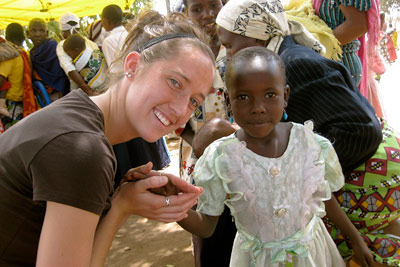Students, faculty travel to Tanzania for global health
By Krishna Ramanujan

Cornell nutritional sciences professor Rebecca Stoltzfus is a firm believer in real-world experience. That's why Cornell's Global Health Program minor, which Stoltzfus directs and helped design, requires students to spend eight weeks getting hands-on experience in a resource-poor environment in a developing country.
For the third year in a row, 15 Cornell students are taking part in the Global Health Summer Session Program in Tanzania. This year, from June 12 to Aug. 5, Cornell undergraduates from the Colleges of Engineering, Agriculture and Life Sciences, Arts and Sciences, and Human Ecology will team up with 15 fourth-year medical students from the Kilimanjaro Christian Medical College (KCMC), who are also part of the summer program.
"Educationally, we believe there is only so much you can learn in a classroom," said Stoltzfus. "Ultimately, you just have to get out in the world."
The students will spend four weeks in a classroom setting, where they work in groups of four with KCMC students and study a topic in depth, interview stake holders and develop a policy case study on an issue relevant for Tanzania. Past issues have included maternal mortality, cervical cancer, the "brain drain" in the health profession and unequal access to human waste management in Tanzania. The cross-cultural teams are intended to challenge students and encourage team building and cross-cultural skills, Stoltzfus said. "At their age, they learn tremendously from other young adults."
At the end of the four weeks, the Cornell students will engage in a monthlong internship. Past internships have included placements in a home for street children, a district hospital, a women's microcredit organization that works in rural communities, an HIV/AIDS international nongovernmental organization and an organization providing education and advocacy against female genital mutilation. Meanwhile, the students stay in a local home, where they are immersed in Tanzanian culture.
Choumika Simonis '11, who majored in human biology, health and society, with a global health minor, marked her summer session in Tanzania as her "most profound turning point" while at Cornell.
"I will never forget my adventures in Tanzania that summer," said Simonis, who served as a nutrition intern in a village on the hills of Mount Kilimanjaro for the Minjeni Women's Group Trust, "or the breathtaking views of Mount Kilimanjaro on my walk to class and on my way to Professor Stoltzfus' house for weekly meetings."
Cornell instructors this summer include Stoltzfus; Laura Harrington, associate professor of entomology; Rebecca Heidkamp, a nutrition graduate student; and Jeanne Moseley, Global Health Program coordinator.
The Global Health Program Summer Session in Tanzania is partly funded by the U.S. Department of Agriculture and Cornell's College of Human Ecology and a Kaplan Faculty Fellowship in Service Learning. The summer program got its start through the help of a seed grant from the Mario Einaudi Center for International Studies at Cornell.
Media Contact
Get Cornell news delivered right to your inbox.
Subscribe